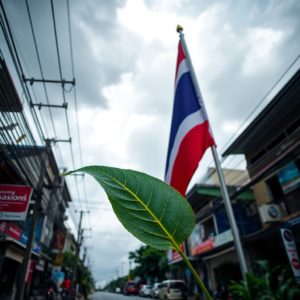In a significant move, the Thai Cabinet has approved two draft ministerial regulations concerning the import and export of kratom, marking a pivotal step in the country’s approach to this traditional Southeast Asian plant. On December 17, the Thai Cabinet, guided by the Ministry of Justice, endorsed these regulations aimed at structuring the nascent legal kratom market.
New Fee Structures and Licensing Procedures
The first regulation, titled “Draft Ministerial Regulations on Fees,” sets the financial framework for importing, exporting, and renewing licenses for kratom leaves. Key fee structures include:
- Import license: 5,000 baht per license
- Export license: 5,000 baht per license
- License duplicate: 1,000 baht per copy
- License renewal: Same as the original license fee
To support small businesses and specific groups, there are incentives such as a 50% fee reduction for kratom leaf exporters who are natural persons and juristic persons registered under Thai law until December 31, 2024. Additionally, community enterprises and government agencies exporting kratom leaves are exempt from fees until the same date.
The second regulation, “Draft Ministerial Regulations on Import/Export Permissions,” delineates the criteria and procedures for obtaining these licenses. Applicants must meet several qualifications, including being a government agency, the Thai Red Cross Society, or a Thai natural person aged 20 or above. The regulation also specifies that applicants must not be mentally ill or have suspended licenses. Juristic persons must be registered under Thai law with designated representatives.
Streamlined Application Process with Exemptions
Applications must be submitted electronically to the Secretary-General of the Narcotics Control Board or a designated person, accompanied by required documentation. Notably, there are exemptions for personal use, allowing travelers to carry up to 50 kratom leaves, 100 grams of kratom leaves, or 1,000 milliliters of kratom tea without needing an import or export license.
These regulations are part of the Kratom Act B.E. 2565, which aims to oversee the import and export of kratom leaves following its removal from the list of narcotics.
A Rich History of Kratom in Thailand
Kratom has a long history in Thailand, traditionally used for centuries. It appears in Thai pharmacopeias dating back to the 1650s, as noted by Pascal Tanguay, an expert on Southeast Asian drug policy. In 1943, the Thai government outlawed the planting of kratom trees due to its competition with opium, on which the government collected taxes.
In 1979, kratom was classified as a Category 5 narcotic, the lowest level in Thailand’s narcotics ranking. Despite the classification, enforcement was lax, and kratom continued to be widely used.

Thailand’s harsh anti-drug policies over the decades led to prison overcrowding, prompting reconsideration of the legal status of plants like cannabis and kratom.
Towards Legalization and Economic Opportunities
In 2019, Justice Minister Somsak Thapsutin announced plans to decriminalize kratom. Although the COVID-19 pandemic delayed these plans, Thailand officially decriminalized kratom in 2021, removing it from the list of prohibited substances. The updated Narcotics Act now permits the possession and consumption of kratom, recognizing its traditional use and cultural importance. This legislative shift also aims to reduce the burden on the justice system and create economic opportunities for kratom cultivators.
Global Implications
Thailand’s progressive stance on kratom reflects a broader global trend towards recognizing the benefits of cannabis and related substances. As countries worldwide reconsider their drug policies, Thailand’s approach could serve as a model, balancing traditional practices with modern economic and health benefits.
These developments underscore the need for international cooperation and clear guidelines on the use of cannabis and CBD-related products. As nations navigate the complex landscape of drug legislation, cases like Thailand’s could pave the way for more nuanced and compassionate policies globally.



